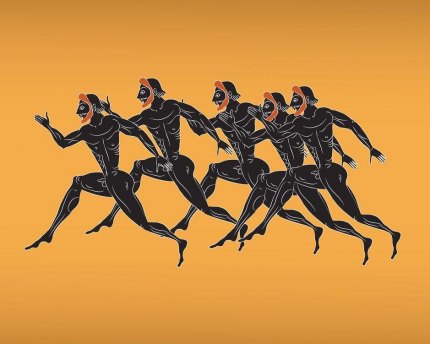
"The only prize was the crown of olive leaves cut from the sacred tree at Olympia," according to an account on the BBC website. Here is the rundown about the early games, along with sources for further study.
When was it first held? The first games were in 776 B.C. They were held in Olympia, Greece, every four years until 393 A.D.
So, what was it about? Early Olympics were "part of a religious festival in honor of Zeus, the father of the Greek gods and goddesses," recounts the website for the Penn Museum.
Were the games a success? Indeed. "By the end of the seventh century, the quadrennial games in honor of Zeus were drawing spectators and contestants to Olympia from the entire Greek World. Shortly thereafter, three new Panhelenic games were instituted at other sanctuaries: the Pythian games for Apollo at Delphi (582 B.C.) the Isthmian games for Poseidon near Corinth (581 B.C.) and the Nemean games for Zeus at Argos (573 B.C.)," according to Ancient Greece, a Political, Social and Cultural History, by Sarah B. Pomeroy, Stanley M. Burstein, Walter Donlan and Jennifer Tolbert Roberts (Oxford University Press; 2008). The games "had the avowed purpose of knitting together the Greeks in peaceful celebration. During the Olympic Games, for example, a sacred truce banning war throughout the Greek world was declared for the month in which the games were held."
Who participated? "All free male Greek citizens were entitled to participate in the ancient Olympic Games, regardless of their social status," according to the website for the Olympic Games. Married women could not come, the website notes. But unmarried women could attend. A privileged position beside the altar was set aside for the priestess of Demeter, goddess of fertility.
The athletes competed nude.
What sort of events were held? "Koroibos, a cook from the nearby city of Elis, won the stadion race, a foot race 600 feet long," the PennMuseum website reports. "According to some literary traditions, this was the only athletic event of the games for the first 13 Olympic festivals." After that, other common events included wresting, boxing and the pankration, a rough combination of boxing and wresting. The pentathlon was also featured. It combined the race, javelin and discus throws, the long jump and wrestling.
What brought an end to the games? The emperor Theodosius I abolished the games in 393 or 394 A.D., as part of an attempt to encourage Christianity, according to the Tufts.edu website.
Resources:- Ancient Greece, a Political, Social and Cultural History, by Sarah B. Pomeroy, Stanley M. Burstein, Walter Donlan and Jennifer Tolbert Roberts (Oxford University Press; 2008).
- BBC: History, Ancient Greeks Olympic Gallery, by Judith Swaddling, Feb. 17, 2011.
- History News Network, George Washington University: Olympics -- They Used to Compete Nude.
- International Olympic Committee website: The Athlete.
- The Penn Museum website: The Real Story of the Ancient Olympic Games.
- Tufts.edu, Perseus Project: Frequently Asked Questions about the Ancient Olympic Games.